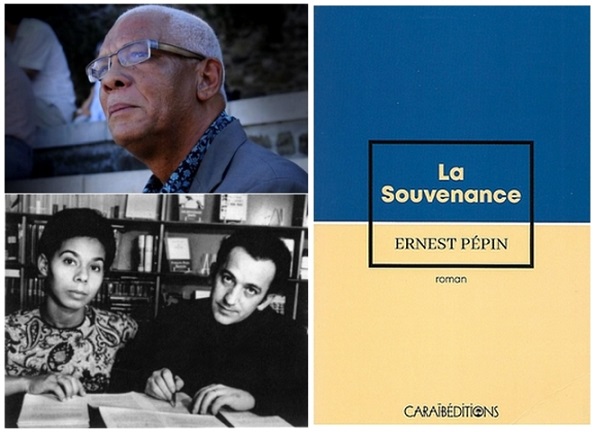
In “En quête de la parole: Ernest Pépin dans la Souvenance des Schwarz-Bart” [In Search of the Word: Ernest Pépin in the Remembrance of the Schwarz-Barts], Loïc Céry (Institut du Tout-Monde) reviews Ernest Pépin’s new book, La Souvenance (Caraïbéditions, 2019). He writes, “Ernest Pépin’s new novel [. . .] evokes the career of Simone and André Schwarz-Bart. A magnificent story in search of two creative consciences, a text inhabited by the unfading presence of Guadeloupe. An indispensable and important book.”
This book offered to us by Caraïbéditions at the end of 2019, Ernest Pépin’s La Souvenance, is at the same time strong, sumptuous, and magical. It is a “novel”—to which one must hasten to attest, before any other consideration—that is impossible to classify: a fictional biographical narrative, a reconstruction of itineraries, a poetic ode. We are hard-pressed to delimit the boundaries of this wonderfully lucid, generous, and sensitive evocation, under the authorship of one of the fundamental writers of the Caribbean.
On the fervent trail of André and Simone Schwarz-Bart, Ernest Pépin certainly deploys what will remain among his essential works, a text to welcome the blissful complementarity of the recent autobiographical testimonial narrative published by Simone Schwarz-Bart herself at Éditions Grasset, Nous n’avons pas vu passer les jours [We did not see the days go by]. Where the Guadeloupean novelist witnesses a life of accomplishment, co-edification and symbiosis with André Schwarz-Bart (author of Le Dernier des justes), Pépin succeeds (without ever making us aware of the slightest exercise in style) in the tour de force of inviting us, with infinite elegance, to join in the days of one of the most outstanding couples in world literature, placing us at the heart of two consciences of Jewish and Caribbean memories. Is it necessary here to speak of an ability of anamnesis on the part of the writer with these creative psyches that found themselves embarking on a common itinerary of creation, or rather of a very subtle complicity with two destinies united in a trajectory made of both passion and a joint presence in the world?
One must believe, in reading these pages—themselves passionate—that in addition to this already considerable collusion, another energy allows us to understand the breath that drives the story: the reiterated tension for Ernest Pépin to be once again in a quest for the right word about Guadeloupe. This was the shared crucible for Simone and André, who one day took up residence in this archipelago, in this place of Remembrance [Souvenance], which has since become “Home of the Illustrious” [Maison des Illustres]. Here lies the memory of two trajectories united in the same destiny made of life, of literature, and of listening to the world. The term “generosity” is perhaps one that will, undoubtedly, best synthesize the qualities of the book, be it the generosity of the writing itself or that of this invitation to be ourselves witnesses to these traces of life. A generosity that enriches us considerably, and about which we can certainly apply to Pépin himself one of the ideas he presents in the first pages on André Schwarz-Bart: “A man who writes does not work for himself; he crosses barriers, shatters partitions, and all this to widen the horizons for all.” [. . .]
Excerpts translated by Ivette Romero. For full review, see https://blogs.mediapart.fr/edition/institut-du-tout-monde/article/291119/en-quete-de-la-parole-ernest-pepin-dans-la-souvenance-des-schwarz-bart
Also see https://www.caraibeditions.fr/
